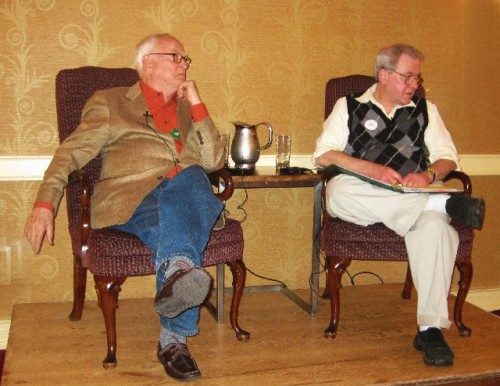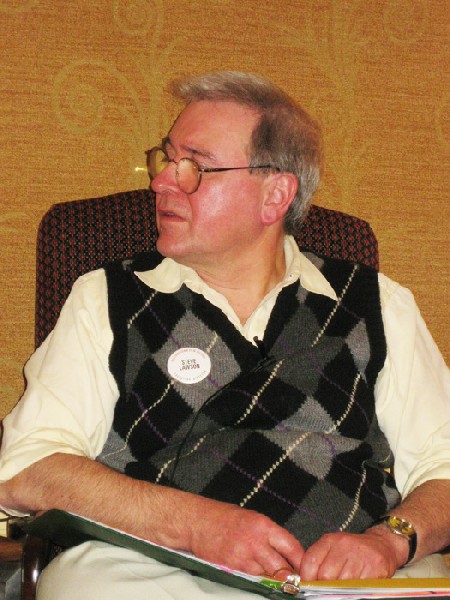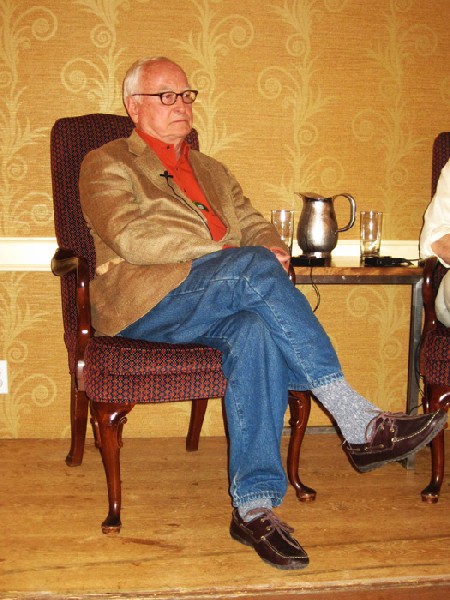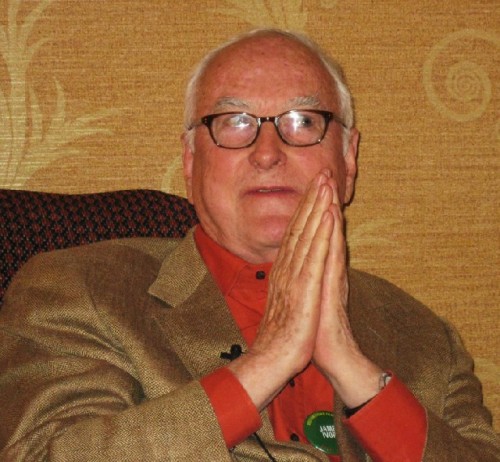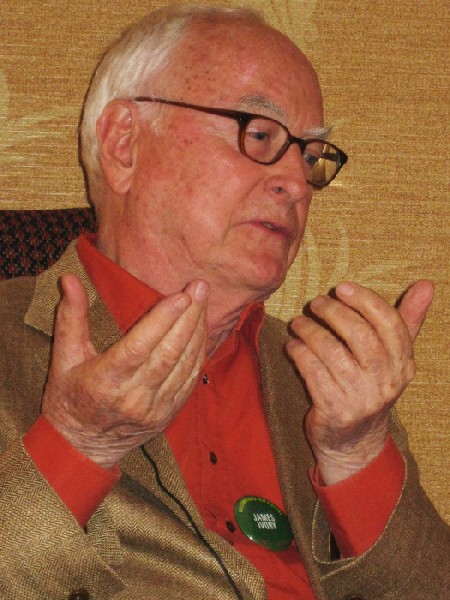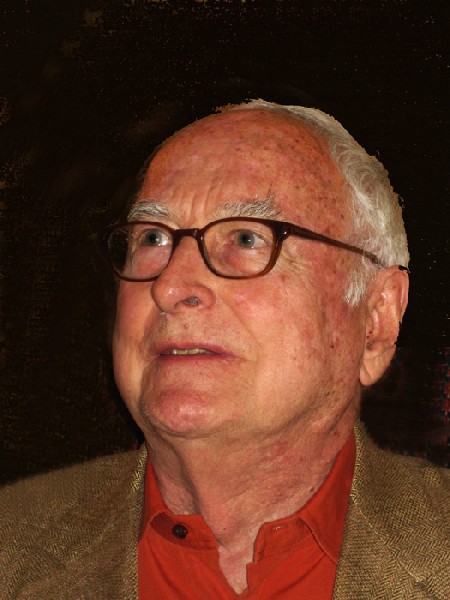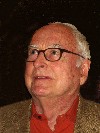James Ivory at Williamstown Film Festival
Dialogue with Artistic Director Steve Lawson
By: Charles Giuliano - Nov 02, 2009
Since its formation in 1961 the team of director, James Ivory and producer, Ismail Merchant (he died in 2005) served as a signifier for high end, art films with superb performances, wordy scripts, and sumptuous productions. They are closer to the small box of PBS and its Masterpiece Theatre sensibility than big screen Hollywood releases.During the recent Williamstown Film Festival Ivory was a featured speaker.
It takes education and taste, breeding if you will, to appreciate their work. Now and then they created films with enough charisma and personality to reach beyond the confines of cult audiences. The third member of the team, who should be accorded logo status, is the long term script writer, Ruth Prawer Jhabvala. It has been her task to turn esoteric, erudite, and uber literary masterpieces by Henry James and E. M. Forester into projects for the silver screen.
Their treatments of the James novels The Europeans (1979) and The Bostonians (1984) take as much concentration, devotion and stamina to watch as they require to read. The films are the visual equivalents of Cliff Notes for English majors. But they had better luck transforming Forester, another worthy but demanding author, into the beloved films A Room with a View (1985) and the multiple Oscar nominated Howards End (1992). Emma Thompson won for Best Actress. The latter film was such a success that it was reprieved the following year by reuniting the team of British actors, Anthony Hopkins and Emma Thompson in Remains of the Day based on the novel by Kazuo Ishiguro. For their roles Thompson and Hopkins were nominated for Oscars.
But they did no favor to the redoubtable Hopkins, one of the finest actors of his generation, tricked up as the caricatured misogynist in the dreadful Surviving Picasso (1996). It was based on the catty, trashy, ersatz biography by Arianna Huffington as told to by the goldigger, talentless, former mistress Francois Gilot.
Similarly, they roasted Nick Nolte on a spit in 1995's Jefferson in Paris. Nolte is too much of a dolt to portray the complex, flawed but brilliant, Virginian gentleman of the Enlightenment. It was too painful to watch particularly with that smarmy, scandalous, sub text about his affair with the slave/ lover, Sally Hemmings. It was a ripped from the headlines, knee jerk bit of silly revisionism. Casting Nolte as Jefferson was like having a cowboy portray a character in a film about fox hunting.
Now and then Merchant and Ivory fall off their artsy pedestal in such absurdly ridiculous camp projects as The Wild Party (1975). It focused on how the career of silent film star Fatty Arbuckle crashed and burned when he did you know what with a champagne bottle at that eponymous celebration. It starred the ever so gifted Raquel Welsh. Similarly, they took another campy winger with pulp novelist Tama Janowitz's Slaves of New York (1989). OK, shoot me, but I thought it was pretty absurdly funny. It saved me the bother of having to read the really awful novel.
During the Williamstown Film Festival one of the highlights was an after lunch dialogue, at Orchards, between artistic director, Steve Lawson, and the living icon of cinema, director, James Ivory.
Well, actually, the occasion was a bit odd. Lawson seemed overawed by the stoic presence of Ivory and tried too hard to convey how much he knows about all of their films. Many of which are justifiably obscure. Ivory, who was born on June 7, 1928, resembled a life sized Houdon portrait with an understated, patrician persona rather like a marble carving. Ivory conveyed elegant design and polished surfaces even though dressed down for the occasion in jeans.
The responses of Ivory proved to be so terse that Lawson ratcheted up the energy by firing off erudite scraps of information loosely formatted as questions. One hoped for something more probing, How to crack the ice with a high and inside fastball. A bit of the chin music that brushes back and animates a subject. But not to be. This was, after all Williamstown, where there are, well, manners and that sort of thing.
Color me odd but I have a fondness for antique sculpture. Actually Ivory touched on that civility. He described working with perfectly wonderful performers on an intimate level. But, years later, upsetting that balance by asking an actor to portray something ugly or mean. One surmised that he meant after the sublime and subtle playing in Howards End and Remains of a Day getting Anthony Hopkins to portray the womanizing jerk, Pablo Picasso. We never sensed in that role his genius as an artist.
Lawson asked how Ivory met Merchant. Ivory was at the time involved with a documentary on Indian painting. After their first effort The Householder it would be 22 years and fifteen films later when they created a masterpiece Room with a View (1985).
As Ivory described it the original idea of the team was to create bi lingual films in India in both English and Hindi. They lucked out when the first film Householder was sold to Columbia Pictures.
That was followed by a question about how Ivory got involved with directing films. The response was surprising when Ivory revealed that he aspired initially to set design. Toward that end he studied architecture, design, and art history at the University of Oregon. After three years he discovered that his true interest was film. He wanted to study film in Paris but the first task was to learn French. While in the midst of that the Korean War broke out after which he enrolled in film school at the University of Southern California.
In the beginning, Ivory wrote the screen play The Householder (1963). When they pitched it to Jhabvala she was frank in telling Merchant and Ivory that she had never written a screen play. They were just as upfront in telling her that they had never directed of produced a film. The rest, as they say, is history. It seems that the work and collaboration is multi valent. There are ideas she suggests and other times when he writes a first draft. He revealed that there is more to it than just dusting off a novel and turning it into a script. There are times when Jhabvala has had to flesh out and beef up characters that didn't appear to fully engage the authors. There may be more to the filmed characters than is conveyed in a straight reading of the original novel.
Later Ivory put to rest the notion that they are looking around for more classic novels to transform into movies. But it often starts with a love of the book. In the case of Mr. & Mrs. Bridges (1990) two books actually, by Evan S. Connell. Amusingly Ivory described a lunch with Paul Newman and Joanne Woodward. The idea of doing "Mrs. Bridges" was being pitched to Woodward. But Newman piped in that if somehow both novels might be conflated as a single script he would be willing to play Mr. Bridges. Well, that happened.
Ivory discussed the delights of working with Newman and Woodward. But having directed films Newman had his own ideas about how to do a scene. After some back and forth Ivory got his way. Ivory was asked about other problems on the set like shooting Howards End in England with its famously bad weather. No problem. During the 12 week shoot they actually had to create rain for a scene. But the British trade unions were a horror to work with. "They were nasty" he recalled but post Thatcher you can now hire anyone you please.
Ivory discussed how much he enjoyed shooting in France. That started with Quartet in 1981. He revealed a life long fascination with France and its culture. "The French crews are terrific to work with" he said. "People told me that nobody will come to see Quartet. In fact, nobody did. But it is still one of my favorite films."
Eventually, the discussion was opened to members of the audience. A teacher commented on using his films to support reading books with students. She lamented the overall decline in respect for language and literature. Noting that Merchant & Ivory films were willing to transform great books into films. She stated that a current exception is the Jane Campion film Bright Star.
While Ivory commented on the superb quality of the Campion film he stated that "I am not looking around for novels to film." Rather the process starts with becoming enamored with a particular novel. That's what happened when someone "Put The City of Your Final Destination in my pocket at a film festival much like this one." The film which has been screened at recent festivals is the first without partner Ismail Merchant (1936-2005). He told a similar story about Remains of the Day which was passed on to him at another festival by someone who said "You will love it. I did love it. But it was optioned to Mike Nichols and Columbia Pictures. It was a chance to work once again with Emma Thompson and "Tony" Hopkins after Howards End."
Inevitably, the director was asked what were his favorite Merchant & Ivory Films and particular performances. His first response was Daniel Day Lewis in A Room with a Review. He discussed Thompson and Hopkins but declined to go further saying that "I would hate to leave someone out."
Someone suggested a book on ballroom dancing, adding with an enticing twinkle, that she knew someone interested in funding it. "We have already done a film based on ballroom dancing Roseland (1977). Which were three stories set in the Roseland Ballroom in Manhattan."
There was a question about the ever shrinking film business and the difficulty of finding funding. He commented that today it would be more difficult if not impossible to fund some of their films. He discussed the difference between raising funds independently and working with a studio. One case in point was Slaves of New York for which there were "No financial problems." While a departure from the high road of most of their films the contemporary content based on a popular novel seemed like a bankable project for the studio. Ivory mused that "I liked to see that work on the screen. It was about the interesting downtown (New York) art scene in the 1980s. The critics heaped such scorn on us. People who loved Room with a View just hated that."
Now and then a project was just "Dropped in our lap." Like Surviving Picasso. He recalled that "I was kept away from meetings with the backers for fear that I might say something wrong." The film project was opposed by Francois Gilot and her son Claude Picasso. No original works were seen in the film. Ironically Picasso had attempted to prevent the publication of Gilot's "My Life with Picasso."
Often aesthetic decisions have financial ramifications. He described almost coming to blows with Harvey Weinstein of Miramax Films during the production of The Golden Bowl in 2001.
When Columbia Pictures backed Remains of the Day he described an executive coming out of the screening room with concerns about the ending. It involved a meeting between the former colleagues and servants played by Thompson and Hopkins. They hint at her coming back to the manor as his companion. But after lingering and repressed emotions they simply depart. So there is no happy ending. "The executive walked out of the film saying that the ending just cost the studio $50 million."
Oh well. Ars gratia artis.

